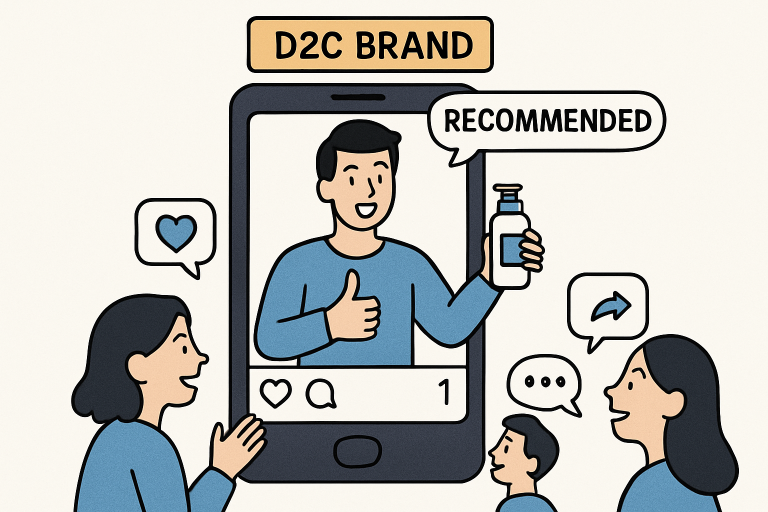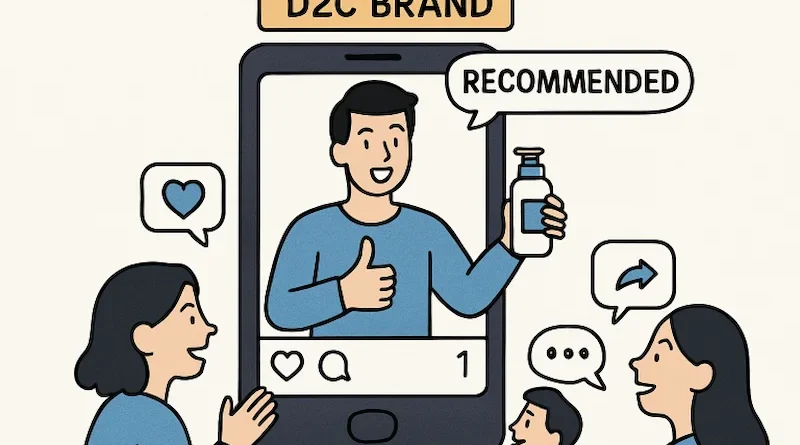The Role of Influencer Marketing in Scaling D2C Businesses
The landscape for Direct-to-Consumer (D2C) brands is shifting rapidly, driven by the demands of digital-savvy consumers. Building brand visibility and trust at scale is no longer easily achieved through traditional advertisements. Instead, innovative brands are finding success through influencer marketing—a strategy powered by the trusted voices of digital creators. By partnering with influencers who already have the attention of targeted audiences, brands can connect authentically and accelerate growth. As many D2C brands look to expand, collaborating with industry experts like Front Row can help both emerging and established names accomplish their expansion goals.
Influencer marketing combines word-of-mouth with digital exposure, creating engaging, credible campaigns. Unlike intrusive ads, influencer content blends into consumers’ daily lives, reaching them where they spend time. This organic connection is vital as audiences prefer recommendations from trusted personalities. D2C brands use influencers for a feedback loop: campaign insights guide marketing decisions and authentic interactions shape products. Influencers amplify brand stories, resonating more as digital communities grow. For brands seeking a direct market route, influencer partnerships are a powerful tool. Many top D2C brands show how effective well-planned influencer marketing can be. Leveraging these collaborations is essential for staying relevant and competitive.

Building Trust Through Influencer Partnerships
In a world saturated with advertising noise, consumers tend to gravitate toward genuine voices. Influencers, by sharing real-life experiences and honest product reviews, bridge the gap between brands and skeptical audiences. Trust is the foundation of every successful D2C business, and influencer recommendations often feel like advice from a knowledgeable friend. According to recent industry insights, over 80% of consumers trust recommendations from micro-influencers more than traditional advertisements, perceiving them as more personal and sincere. This credibility leads to measurable increases in engagement, conversion rates, and ultimately, sales.
Reaching Niche Audiences Effectively
Many D2C brands thrive by targeting highly specific customer segments. Influencers who specialize in these niches—such as beauty, fitness, home decor, eco-friendly living, and more—provide a natural route to capturing the interest of engaged and motivated buyers. By carefully selecting partners whose values and audience align with the brand, D2C companies ensure their campaigns hit the mark. For example, a vegan skincare line collaborating with influencers known for their sustainable lifestyle content can immediately establish credibility within communities already committed to those ideals.
Business Insider highlights how D2C startups, from cosmetics to wellness, use influencer collaborations to enter competitive markets and refine their messaging quickly.
The Power of Micro-Influencers
Micro-influencers—those with audiences between 10,000 and 50,000—often have more influence than their larger counterparts when it comes to engagement and authentic communication. Their communities are more tight-knit, which translates into interactions that feel genuine and trustworthy. According to recent data, Instagram micro-influencers enjoy engagement rates up to 60% greater than larger influencers, offering significant value for D2C brands with limited budgets. The intimacy of their followings enables them to inspire purchasing decisions and gather honest feedback.
Authentic Content Creation
Effective influencer marketing is not just about reach; it’s about resonance. Influencers naturally weave products into their content—tutorials, reviews, daily routines—enabling audiences to see how a product fits within their real lives. This authenticity makes the message impactful and persuasive without coming off as a forced pitch. Additionally, user-generated content can be repurposed by D2C brands in their own email campaigns, social media, and product pages, amplifying the influencer’s impact far beyond a single sponsored post.
Data-Driven Strategies for Optimization
The most successful D2C brands continually refine their influencer partnerships using data. Key performance indicators (KPIs) such as engagement rate, conversion cost, and customer lifetime value are monitored and analyzed. It enables brands to refine their strategies, eliminate ineffective approaches, and segment influencer partnerships for more personalized messaging. Today’s analytics platforms allow the tracking of sales, customer feedback, and long-term loyalty, yielding actionable insights for future campaigns.
Long-Term Partnerships for Sustained Growth
The value of influencer partnerships compounds over time. By establishing ongoing collaborations, brands can cultivate authentic brand advocates rather than one-off promoters. These mutually beneficial relationships foster loyalty among the influencer’s audience and create a more cohesive brand narrative. As influencers become more involved, they can help with product development, beta testing, and launching new collections—integrating themselves deeply within the growth journey of the D2C brand.
Conclusion
Influencer marketing has rapidly become a cornerstone for scaling D2C businesses, thanks to its ability to build trust, reach targeted audiences, and drive both sales and loyalty. As the digital marketplace evolves, leveraging the credibility and creative power of influencers will remain a vital component of sustainable growth strategies for D2C brands.
Visit the rest of the site for more interesting and useful articles.

